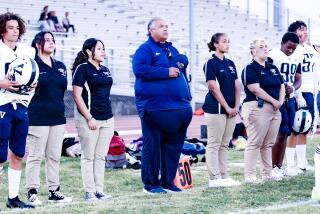Run, Jump, Throw Your Way to Better Academic Performance
- Share via
There seems to be a general attitude among some students and many parents that school sports and fitness courses are a distraction from the real mission of school.
A lot of my students stop taking physical education courses after reaching the required number of credits. And many parents who would never let their kids skip math or English will let them avoid suiting up for PE.
I think this is unfortunate, because the mind and body are interrelated, and physical fitness can actually help improve academic performance.
There are many reasons why every able-bodied student also should be some kind of athlete.
Most important, working and succeeding at a sport helps provide the positive attitude needed to succeed at anything, including schoolwork.
My colleague Pat Cady, a history teacher at Santa Monica High School and coach with the Santa Monica Track Club, agrees: “Your self-image improves, so your confidence improves, and that means you’re going to approach all your tasks . . . with a lot more confidence.”
Self-discipline, a trait I find lacking in about 80% of my students, is another benefit of adhering to an organized and consistent exercise program, and it carries over into academics. In fact, I’ve found that the main difference between good students and bad students is not innate intelligence but persistence--having the stamina to bang away at tough subjects and concepts until they’re mastered.
“Once you’ve learned that kind of discipline,” said Cady, “then getting your homework done, going to class on time, and focusing on a specific task come rather easily.”
Tony Murphy, a physics teacher and football coach at Santa Monica High School, added: “Athletics teach you to keep trying when times get hard. If you take any worthwhile academic course . . . there will be times when you think you can’t do it, just as in athletics.”
There also are some biological responses to exercise that can apply to schoolwork.
“When you exercise consistently, your body releases endorphins,” said Terry Saunders, a physician’s assistant in Hollywood. Endorphins are chemicals released in the brain that create a kind of natural “high.”
“You tend to feel better about the things you do, such as studying, and you tend to do them more consistently,” he added.
Exercise also is an excellent remedy for a significant physical problem: stress.
“When you’re doing a lot of intensive academic work, you’ve got to exercise,” said Saunders.
In order to reap any academic benefits from exercise, you must first make sure that your program is solid.
Start by choosing a sport or exercise that you will enjoy and look forward to doing. Some students prefer team sports, but others enjoy the convenience and self-focus of individual sports.
Running, swimming, bicycling and other aerobic exercises are especially good for students who are new to sports or doubt their ability to excel in them.
“With aerobic exercise, you get tremendous improvement in the first couple months, even the first couple weeks,” Cady said. “That’s very encouraging and builds confidence quickly.”
Choose a form of exercise that elevates your heart rate well above normal, and do between three and five sessions per week.
Exercising more often than that, warned Saunders, will hurt you. “You have to give your body a period to rest, regenerate itself and adapt to the changes.”






